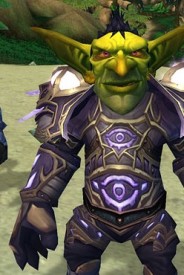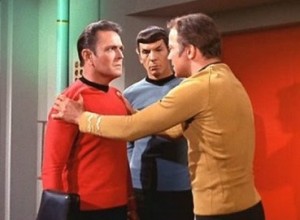After my first article about Tabletop Stereotypes, I received a lot of feedback on other kinds of stereotypes that are out there in the pen-and-paper RPG universe. You can check out the first seven here. While the first list was never meant to be all-inclusive, it became obvious a second installment was necessary to help fill in some gaps. Bear in mind, however, that while some of these may seem obscure, they nonetheless all remain valid.
The Center of Attention
(aka The “Me-Me-Me”, The Attention Seeker)
What is construed as a strong verbal presence or highly-valued admiration of a tabletop game can sometimes be a sign of a different problem. The Center of Attention plays for the social aspect rather than the game itself, and then they try to monopolize it. They are the person who needs to be in charge of the game flow, and when a PC group forms a team that needs a leader, they are always the first voice to take on the task.
While active participation is always a good thing when playing a tabletop, The Center of Attention takes it too far. They are the first with an idea (usually the loudest). They will take up considerable time repeating their ideas and opinions in a progressively louder voice if you don’t agree with them or are trying to formulate your own feedback. If the time you spend with this stereotype is less than the time you spend with all of your other players combined, then you’ve clearly not given them serious consideration, and it’s taken as an offensive action.
Disadvantages for a GM:
- By actively trying to claim a majority of attention within a game session, they take time away from the rest of the group and thus hampering their enjoyment of the game.
Advantages for a GM:
- Your group will almost always voice their own dissatisfaction with The Center of Attention for you.
- You have every justification of throwing every terrible NPC at him/her.
The Drama Queen
(aka The Thespian, The Over-Actor)
Not to be confused with The Center of Attention, The Drama Queen is someone who doesn’t care if they are getting attention, so long as they are the loudest voice. Every single action taken is either the greatest moment in modern gaming history, or the worst tragedy ever to befall a player character.
They did 5 hit points of damage against the level 20 boss NPC with 600+ HP? “BOOYAH, TAKE THAT!”
The boss NPC does 1 HP of damage to their character? “OH, WHAT THE HELL IS THIS? WHAT AM I GOING TO DO NOW?!?”
One of the most intriguing characteristics of The Drama Queen is the ability to play their character with a determined, intentional bi-polarity, switching from ‘my character is invincible’ to ‘my character is completely useless’ before you can even ask what their armor class is. The Drama Queen embodies the idea of “taking it too far”.
Disadvantages for a GM:
- It’s frustrating enough dealing with difficult gamers. Dealing with one that can be any one of two personalities at any time just makes baby GM angels cry.
Advantages for a GM:
- Drama Queens serve as a great example to other players of how NOT to act at a gaming table, and can serve as a learning experience for newer gamers.
The Distracted
(aka The Flighty, The “Wait, what?”)
While embodying no specific gaming or personality styles, The Distracted gamer is literally just that. They may be good gamers. Hell, they could be fantastic gamers. But you’d never know it. They are far too preoccupied with anything and everything around them, from silly internet cats to this weird melted cheese pattern on their potato skins that looks like Hitler. They can take any game and send it to a screeching halt. They are never ready for their action when their initiative comes around, and they are always the last to roll when you give the entire room a skill check, simply because they weren’t paying attention.
Technology certainly doesn’t help, giving The Distracted access to more You Tube videos then they would ever need. The worst of this breed engages in other gamer activities while trying to play your tabletop. For example, they will start playing World of Warcraft in the middle of a session – an activity they could easily do if they had just stayed home instead. They may even ask you to wait for them to take down that elite mob before they even begin to listen to what you’re saying.
It’s not so much that they supply disruptive interaction; they just barely interact at all.
Disadvantages for a GM:
- Each Distracted gamer in your group will add time to any game you are trying to run.
- They have a knack of dragging other people into their Distraction Bubble.
Advantages for a GM:
- They’re an easy fix: make them miss their action(s). Bear in mind, however, this may backfire and turn them immediately into The Drama Queen.
The Anti-Munchkin
(aka The Martyr)
As frustrating as The Munchkin can be, they are rivaled by their polar opposites, The Anti-Munchkins. The Anti-Munchkin takes the completely opposite approach to their character, and instead tries to make them as useless as possible. From putting all of their skill ranks into Use Rope (and not carrying any with them) to taking a proficiency in 2-handed bastard swords (with a strength of 6), the Anti-Munchkin does everything they can to be utterly and hopelessly incapable of anything productive in a game.
But it’s not all for naught. The point to making a character this ineffective is for the sole purpose of complaining and whining about how bad their character is (borrowing elements from The Drama Queen during downswings). In most situations, you’d expect this case to be a result of a new tabletop player, or someone new to the game system. Nope, not this one. Some people strive to be at the bottom, just so everyone else knows it. The Anti-Munchkin can easily ruin everyone’s good time.
Disadvantages for a GM:
- While occasionally leading to comedic situations, there are otherwise little to no redeeming qualities to this kind of gamer. There’s no salvaging any use out of this type of player with a character that terrible.
Advantages for a GM:
- Useless characters are easier to kill and none of the other PCs will miss them. You can then force the Anti-Munchkin to make a new character and supervise the creation to prevent it from happening again.
The Old Timer
(aka The Reminiscer, The Cranky Old Man)
It’s a general acceptance amongst the paper gaming community that D&D 4.0, noble as it was, was a mistake. While some novice players find the simplicity and ease of understanding a nice, enjoyable gateway to the world of tabletops, most veterans hated the dumbed-down rules and missed the complexity of having a wide variety of options available to a character. (Also, they killed off the pantheon). I do give Wizards of the Coast credit for trying to bring veterans back by digging up old source materials and updating them to the 4th edition setting, such as Ravenloft and Forgotten Realms but nice try with Dark Sun; we all wanted that in 3.5… jerks.
/editorial
For veterans who are mad about D&D 3.0 and 3.5 versus 4.0, this stereotype doesn’t really apply (besides, we all moved on to Pathfinder). No, this stereotype applies to those who go even further back, saying things like, “Back in my day, spell failure was based on an ability score, not the armor you’re wearing”. They take full pride in analyzing a game system and arguing about how much better the older edition was, even though the newer one is generally vastly improved and streamlined. Their biggest problem is they can’t play their old editions anymore. Most of their 1st/2nd edition friends have either cannot commit to a tabletop due to, you know, life, or they kept with the times and are now on the modern iteration of the game.
Because The Old Timer can’t get their fix, they force themselves upon your game, your edition, and they’ll do everything they can to remind you how much the game sucks now. With all that intricate comparison, you’d think that they have a firm grasp of the new rules. (Pro Tip: they usually don’t.)
Disadvantages for a GM:
- They just don’t understand the rules. Or refuse to. Either way, it’s still a pain in your ass to deal with.
Advantages for a GM:
- They generally don’t mean any ill will towards the other players.
- They will always be the oldest person at the table, regardless of actual age.
The Last Action Hero
(aka, The Dungeon Crawler, The Dice Roller)
For any tabletop game, there are a blend of elements at play. Successful tabletops require creativity, teamwork, attentiveness, and full participation. When you sit down and portray a character at a tabletop, it’s true to the term “role-playing”. You create a character, and suddenly you’re an actor for this new persona. The Last Action Hero avoids this tabletop art form. They lend themselves to all of the action and none of the story or plot. They make characters with the sole purpose to fight. They don’t cause internal conflict amongst other players, but they get very bored when you are not killing things.
Nearly every tabletop game has an initiative system, utilized for assigning an action order. Initiative is almost always utilized during battles of some kind. That’s when the Last Action Hero is really a player. Regardless of character background, all they want to do is battle. Outside of initiative, they provide little to no interaction with the rest of the group, nor do they really contribute to their own character development. They show up to your game sessions just to roll dice, and when they aren’t rolling dice, they’re grumpy about it.
Disadvantages for a GM:
- You’ll spend a lot of time worried that you are not engaging the player enough, but they’ll never be satisfied unless they are constantly rolling dice for actions.
Advantages for a GM:
- The Last Action Hero also tends to be a strategist, and wrangles other players together to formulate plans of attack when the time is right.
The Red Shirt
(aka The Human Shield, The Darwin Award Winner)
Player character death is never a wanted circumstance (unless you have a very evil GM). Depending on the game setting and the GM style you’re dealing with, characters shouldn’t be dying all that often (unless it’s a system like Paranoia or Call of Cthulu that thrives off players dying). Nevertheless, player deaths do happen on occasion. Sometimes, there’s only so many dice rolls a GM can fudge for you, or you just really need to learn a lesson from your mistakes. The Red Shirt, however, never learns anything.
In his defense, he doesn’t purposefully create characters for the sole purpose of death. Sometimes, that’s just the way the dice roll. From infuriating the wrong fellow player character to rolling a critical failure at the absolute worst time, The Red Shirt seems destined to be the disposable character. There’s plenty of ways a character can die, and they have probably seen them all. Their propensity for death has given them quite an interesting reputation, with equal parts humor, pity, and flat-out head scratching.
Disadvantages for a GM:
- If they were merely a bad player, it’d be easier to handle them. You almost want it to be their fault, but it just isn’t the case.
- Constantly making new characters can be time-consuming.
Advantages for a GM:
- Just like M. Night Shyamalam, they can add a twist to any game. No, really, any game.
Joe Bouchard is an avid gamer and is a regular contributor to the site. 15 tabletop veteran, he spends his Friday nights at the local college rolling dice with people mostly even older than him (but not in The Older Timer kind of way). His current tabletop is Shadowrun 4th edition. He can be reached at joe@cardboardrepublic.com.
Are there any groups you feel are still missing? You can discuss this article and more on our forums!




